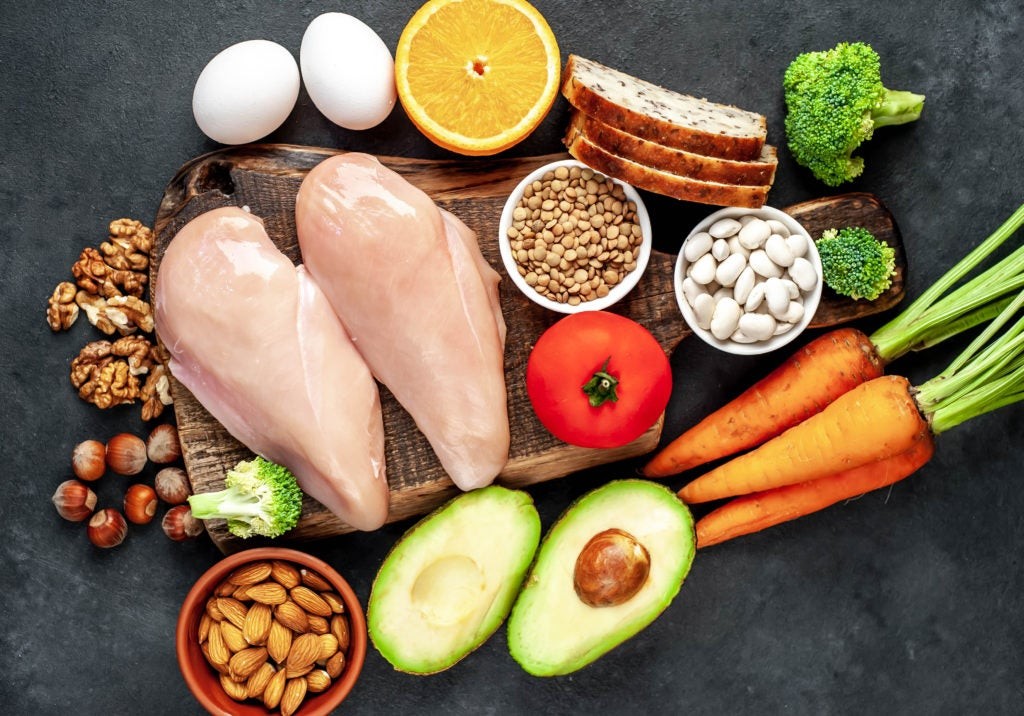Niacin, also known as vitamin B3, is an essential water-soluble vitamin crucial for various bodily functions. It’s naturally present in many foods, added to fortified products, and available as a dietary supplement. The two main forms of niacin are nicotinic acid and nicotinamide. Our bodies can also synthesize nicotinamide from tryptophan, an amino acid. As a water-soluble vitamin, excess niacin is excreted through urine. Niacin acts as a coenzyme, supporting over 400 enzymes involved in energy conversion, cholesterol and fat synthesis, DNA repair, and antioxidant activities. [1,2]
Recommended Daily Intake of Niacin
Understanding the recommended daily intake (RDI) of niacin is key to ensuring optimal health. Niacin is measured in milligrams (mg) of niacin equivalents (NE), where 1 NE equals 1 mg of niacin or 60 mg of tryptophan.
- RDA (Recommended Dietary Allowance): For adults aged 19 and older, the RDA is 16 mg NE for men, 14 mg NE for women, 18 mg NE for pregnant women, and 17 mg NE for lactating women.
- UL (Tolerable Upper Intake Level): The maximum daily intake unlikely to cause adverse health effects for adults 19+ years is 35 mg.
Health Benefits of Niacin
Niacin plays a significant role in maintaining overall health. Let’s explore some key health benefits:
Cardiovascular Health: Niacin, specifically nicotinic acid, has been used to manage dyslipidemia, a condition characterized by unhealthy cholesterol and triglyceride levels, which is a major risk factor for cardiovascular diseases (CVD).
While high doses (1,000-2,000 mg daily) of nicotinic acid can increase HDL (“good”) cholesterol and lower LDL (“bad”) cholesterol and triglycerides, side effects like skin flushing and stomach upset often limit patient compliance. Recent clinical trials have questioned the consistent benefits of nicotinic acid in reducing cardiovascular events or mortality.
- Recent studies suggest that niacin supplements may not significantly reduce CVD events or deaths, even when combined with statins. [3,4]
- A Cochrane review indicated that nicotinic acid supplements do not reduce overall deaths, CVD deaths, heart attacks, or strokes, and may be associated with adverse side effects. [5]
- The FDA has re-evaluated the benefits of niacin extended-release tablets and fenofibric acid capsules taken with statins, suggesting the risks may outweigh the benefits. [6]
Cognitive Health: Severe niacin deficiency has been linked to cognitive decline, including memory loss and dementia. Niacin is believed to protect brain cells from stress and injury. However, the impact of smaller variations in dietary niacin intake on brain function is still under investigation.
- A prospective study found a protective effect against Alzheimer’s disease and cognitive decline in individuals with higher niacin intakes. [7]
- The CARDIA study associated higher niacin intake during young adulthood with better cognitive function scores in midlife. [8]
- Ongoing clinical trials aim to further clarify niacin’s effects on brain health. [9]
 A variety of foods rich in Niacin Vitamin B3 including legumes, nuts, poultry, and grains
A variety of foods rich in Niacin Vitamin B3 including legumes, nuts, poultry, and grains
What Foods Have Niacin (Vitamin B3)?
Niacin is widely available in various foods, making deficiency rare. Here are some excellent sources:
- Red Meat: Beef and pork are rich in niacin. Beef liver is a particularly good source.
- Poultry: Chicken and turkey provide significant amounts of niacin.
- Fish: Many types of fish, including tuna, salmon, and swordfish, are excellent sources of niacin.
- Brown Rice: A whole grain option that contributes to niacin intake.
- Fortified Cereals and Breads: Many processed cereals and breads are fortified with niacin to enhance their nutritional value.
- Nuts and Seeds: These provide a plant-based source of niacin.
- Legumes: Beans, lentils, and peas are good sources of niacin for vegetarians and vegans.
- Bananas: A convenient and readily available fruit that contains niacin.
Niacin Supplements
Niacin is available in supplement form as nicotinic acid or nicotinamide. Supplement dosages often exceed the RDA, potentially causing flushing (reddening of the skin). Prescription niacin supplements, typically in extended-release form, are used to treat high cholesterol but should only be taken under medical supervision due to the high doses involved (up to 2,000 mg daily).
Niacin Deficiency and Toxicity
Deficiency
Niacin deficiency is rare in industrialized countries due to its widespread availability and fortification of foods. Severe deficiency leads to pellagra, characterized by a dark rash on sun-exposed skin, a bright red tongue, and gastrointestinal issues. Other symptoms include:
- Depression
- Headache
- Fatigue
- Memory loss
- Hallucinations
Groups at Risk:
- Individuals with limited diets lacking variety and quantity of foods.
- Populations in developing countries that rely heavily on corn or maize, which have low levels of absorbable niacin and tryptophan.
- Those with chronic alcoholism, which impairs nutrient absorption.
- Individuals with carcinoid syndrome, a condition that diverts tryptophan to serotonin production instead of niacin.
Toxicity
Toxicity from food sources is uncommon, but it can occur with long-term, high-dose supplementation. A common sign is skin flushing with itchiness or tingling. High doses of nicotinic acid may also elevate uric acid levels, increasing the risk of gout.
Other signs include:
- Dizziness
- Low blood pressure
- Fatigue
- Headache
- Upset stomach
- Nausea
- Blurred vision
- Impaired glucose tolerance and liver inflammation in severe cases (at very high doses of 3,000-9,000 mg daily for months/years) [1]
Interesting Facts About Niacin
-
While many believe B vitamins boost energy, taking excessive amounts of niacin beyond the RDA won’t provide extra energy. A balanced diet is generally sufficient.
-
Corn is naturally high in niacin, but it’s bound to carbohydrates, making it difficult to absorb. Nixtamalization, a traditional process using calcium hydroxide, makes the niacin absorbable.
Conclusion
Niacin (Vitamin B3) is an essential nutrient found in a wide variety of foods, playing a crucial role in energy metabolism, cardiovascular health, and cognitive function. While supplementation may be necessary in certain cases, obtaining niacin primarily through a balanced diet rich in foods like meat, fish, poultry, legumes, and grains is generally recommended. Awareness of the recommended daily intake and potential risks associated with excessive supplementation is vital for maintaining optimal health. Consult with a healthcare professional or registered dietitian for personalized advice.
References
- National Institutes of Health. Niacin. https://ods.od.nih.gov/factsheets/Niacin-HealthProfessional/
- Harvard T.H. Chan School of Public Health. Niacin – Vitamin B3. https://www.hsph.harvard.edu/nutritionsource/niacin-vitamin-b3/
- The AIM-HIGH Investigators. The role of niacin in raising high-density lipoprotein cholesterol and reducing cardiovascular events in patients with atherosclerotic cardiovascular disease and optimally treated with simvastatin: AIM-HIGH trial. JAMA. 2011;306(19):2086-93.
- Landmark Study Finds No Added Benefit From Niacin in Statin-Treated Patients With Heart Disease. National Heart, Lung, and Blood Institute (NHLBI). https://www.nhlbi.nih.gov/news/2011/landmark-study-finds-no-added-benefit-niacin-statin-treated-patients-heart-disease
- Cochrane Database Syst Rev. 2014 Aug 14;(8):CD009743. doi: 10.1002/14651858.CD009743.pub2.
- FDA Drug Safety Communication: FDA concludes that the weight of evidence does not support that niacin/statin combination products offer an incremental benefit on cardiovascular morbidity and mortality compared to statin monotherapy. FDA. April 15, 2016. https://www.fda.gov/drugs/drug-safety-and-availability/fda-drug-safety-communication-fda-concludes-weight-evidence-does-not-support-niacinstatin
- Morris MC, Evans DA, Bienias JL, Tangney CC, Bennett DA, Wilson RS, Aggarwal NT. Dietary niacin and the risk of incident Alzheimer’s disease and of cognitive decline. J Neurol Neurosurg Psychiatry. 2004 Aug;75(8):1093-9.
- Steffen LM, Zhou X, Rebholz CM, Shivappa N, Hébert JR, Guan W, Ning H, Lloyd-Jones DM, Tucker KL. Associations of B-vitamin intakes during young adulthood with cognitive function in midlife: the Coronary Artery Risk Development in Young Adults (CARDIA) study. Am J Clin Nutr. 2017 Feb;105(2):368-376.
- ClinicalTrials.gov. https://clinicaltrials.gov/

